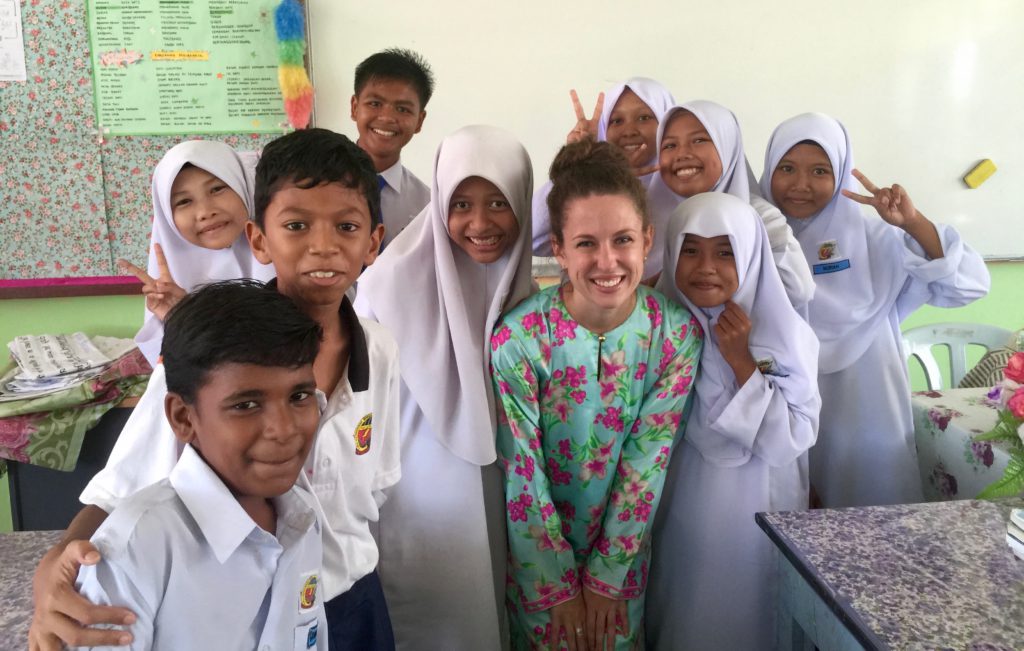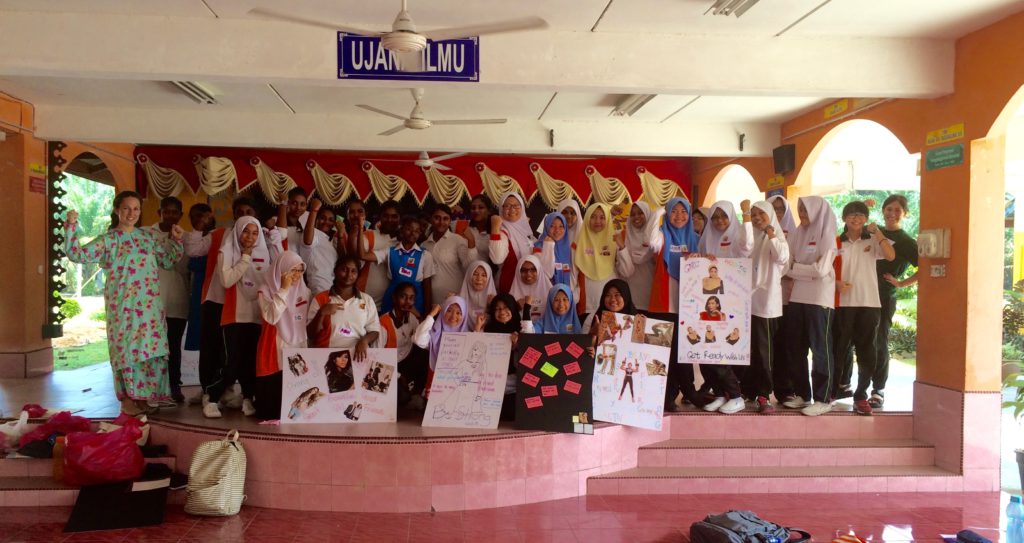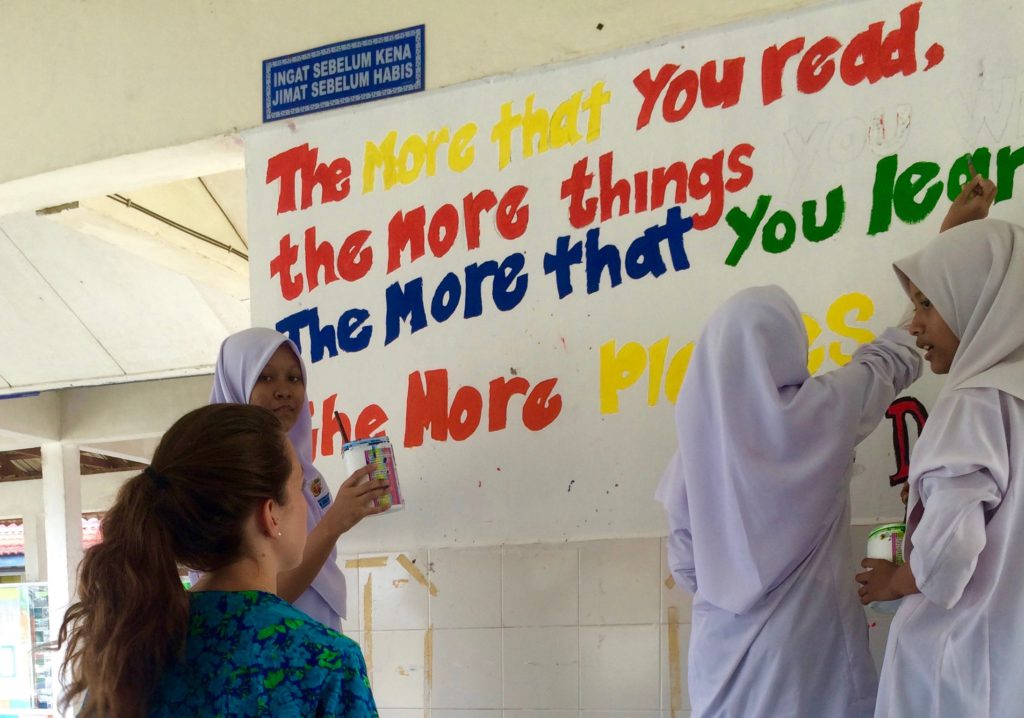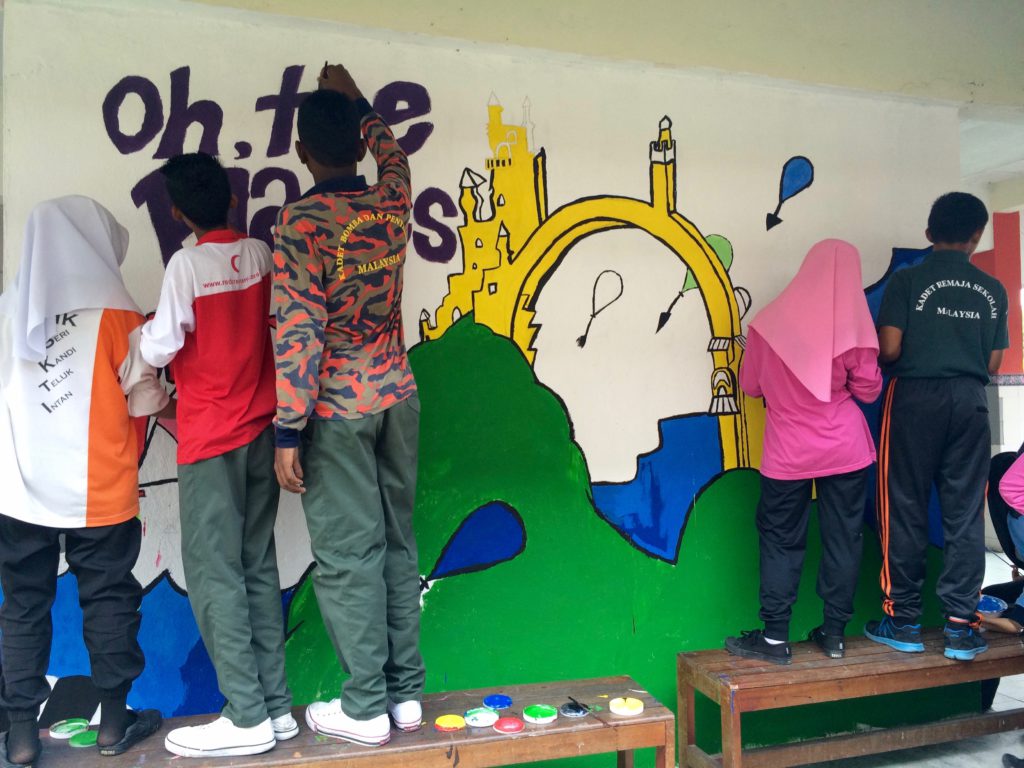The popular Fulbright English Teaching Assistant (ETA) award offers Americans the opportunity to work in schools overseas to supplement local English language instruction and to provide a native speaker presence in classrooms. Fulbright ETAs support classrooms ranging from kindergarten to university level. While abroad, they also serve as cultural ambassadors for the U.S. while they meet, work, live with and learn from the people of the host country, sharing daily experiences.
Malaysia offers Fulbright ETA awards and each year receives one of the highest average numbers of ETA applications compared to other Fulbright locations. This coming grant cycle, Malaysia is offering 100 ETA awards (application deadline: October 11, 2016). To learn more about the Fulbright experience in Malaysia, we interviewed recent ETA Michelle LeMeur who provided her insights and Fulbright application tips.
1. What inspired you to apply for the Fulbright ETA in Malaysia?
Since returning from a semester in Italy as an undergraduate, I had wanted to spend more time living abroad. I found that most experiences, interactions, and even misadventures while living in Rome gave me a much deeper understanding of the city, country, region, and culture than I had gained as a tourist in Rome several years prior. Through my program in Rome, I taught English at a local high school, and loved how I was able to integrate into a different part of the community and culture through my time with my students.
A few years after graduating, I learned that Fulbright also offered English teaching grants, and I felt like I had found the perfect fit. I was struck by the program’s focus on cultural exchange and emphasis that grantees are not sent to their placement to “fix” anything, but instead are expected to listen, serve, and learn alongside their community members. I knew I had to apply; the only remaining question was where.
As I considered the vast range of countries to which I could apply, I knew I wanted to immerse myself in a region and culture with which I was not yet familiar. I decided to research the programs in Southeast Asia, and for a variety of reasons, Malaysia emerged as the perfect fit for me. Some reasons were small and seemingly logistical, such as the guarantee of a roommate and the in-country support of the Fulbright Commission, MACEE (the Malaysian American Commission on Educational Exchange). Others were more programmatic, such as the opportunity to lead extracurricular activities and programming (or “kokos”). Additionally, I thought that living in a Muslim-majority country would deepen my understanding of Islam, which I had little exposure to. I felt that gaining that understanding was important for both my personal development and my ability to responsibly engage in many of the important conversations about the role of religion taking place then and now.
2. What were the best and most challenging aspects of your time in Malaysia?
Though it took a significant portion of the year to build relationships with many of my students, most of my favorite memories involve casual conversations and hanging out with students at school and in our town. Every time I hear the song “Cheerleader,” I’m immediately transported back to our local McDonald’s where Azikah, a student who was insecure about her big, wonderful personality, sang that song to me because “Miss, you are my cheerleader and you make me brave.” This July, as the end of Ramadan approached, my calendar felt empty without all the invitations to visit students’ homes for a celebratory meal during Hari Raya, or Eid. Breakthrough moments in the classroom were always a highlight, such as when a particularly shy student finally got up the courage to raise his hand and tell me what he did that weekend, or when a previously disengaged student laughed so hard she cried during my mom’s very theatrical reading of Rumpelstiltskin in class.
Of course, the year was not without its challenges. Some days, the fact that we didn’t have wifi at home was extremely frustrating, especially if a friend could only Skype at 6am, before any local places with wifi opened. After six months in Malaysia, it still took my roommate and I two days to pay a bill due to miscommunications and inconsistent business hours. Though the bill was hardly life-threatening or even urgent, I think we both almost cried out of sheer exhaustion at the fifth or sixth “no, cannot” we received. Many of the challenges I experienced are typical of the miscommunications and misunderstandings that come from adapting to a new culture, language, and community. I found that taking a deep breath, reminding myself of that fact, and trying to find a new way to approach the situation and/or connect with the person in front of me generally mitigated and even solved most problems I faced.
My time in Malaysia made a profound impact on me and changed my life. I have a broader, more global perspective, I am infinitely more patient, and I have a clearer sense of how my strengths and interests can translate to my career.
3. What tips would you give others applying to the Fulbright ETA?
While the ETA program operates in many countries, the length of the grant, requirements, placement types, and many other factors can vary country to country. I suggest identifying a region, researching the various programs in that region, and determining which might be a good fit (note: this does not mean you have to be overly knowledgeable about the country!). That being said, be realistic terms of finding an exact match, and be aware that there’s no way to anticipate most of what your experience will entail. At the end of the day, the ability to be flexible and patient is far more valuable than finding the program that will guarantee your proximity to a metropolitan area.
In hindsight, I think two things helped my application stand out. I presented specific ideas for lessons and programming, while acknowledging that I would have to adapt those ideas to my school’s specific needs, the availability of resources, and various cultural norms. This showed that I had given thought to what I could do with the opportunity, while being aware that my ideas and ways of doing things were not necessarily the only or best way. Additionally, I truly love learning about different cultures and parts of the world, and that curiosity and excitement came through in my application. Fulbright is designed to increase mutual understanding, and they are looking for candidates who will dive in and learn as much as they can, while increasing English language abilities and knowledge of the United States. In both your application and any interviews, think about the broader goals of the Fulbright Program and make sure to connect your background, experiences, and personal characteristics to your ability to succeed as a classroom teacher and cultural ambassador.
Michelle LeMeur was a Fulbright ETA grantee in Malaysia in 2015. She earned her BA in International Studies from Johns Hopkins University. While at Hopkins, Michelle spent a semester in Rome, Italy during which she taught English as a Language Assistant at a local high school. Prior to Malaysia, Michelle was the Manager of Program Operations for the National Academy of Advanced Teacher Education (NAATE), a program of study for high-performing teachers from high-needs schools across the United States. She is currently on the research team at a hedge fund, and is enjoying reacquainting herself with everything that New York City has to offer.
© Victoria Johnson 2016, all rights reserved.
Interested in applying? Bookmark the Fulbright English Teaching Assistantships (ETA) to your ProFellow account!



